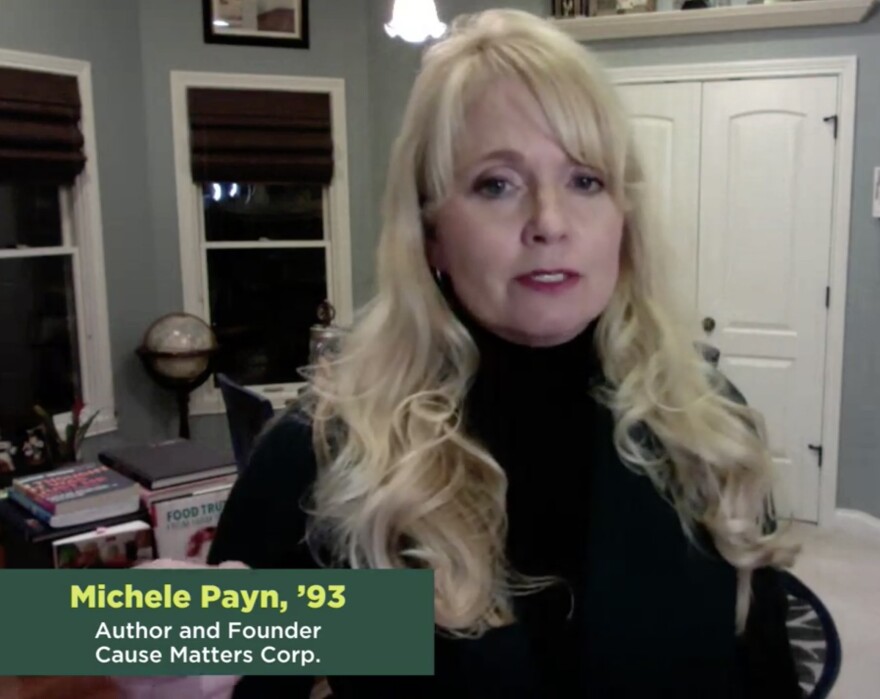Let’s talk about what's on your plate. With the U.S. food retail industry topping $5 trillion in annual sales, it's no wonder why brands are battling for a spot in your pantry or fridge. Food is big business. And as we head into the holiday season, that battle gets fiercer. Unfortunately, for consumers, that means the grocery aisle can be filled with hundreds of thousands of dubious claims with the intention of spurring a purchase.
So how can we cut through the noise and make healthy and tasty food choices for our families? We'll hear from two Spartans whose lives revolve around food: award-winning author and speaker, Michele Payn and MSU corporate chef, Kurt Kwiatkowski. Michele and Chef Kurt will pull back the curtain on food and demystify some of the myths and misnomers fed to consumers.

Michele is a 1993 graduate of the College of Agriculture and Natural Resources, holding a degree in agricultural communications and animal science. She's an award-winning author and the founder of Cause Matters, a company dedicated to addressing food myths and connecting the farm to food. Her latest book, Food Bullying: How to Avoid Buying BS, dives into the marketing tactics and psychology that pressure consumers into questioning their food choices. Michele is a passionate advocate for global agriculture and a catalyst for re-establishing food as a means of celebration rather than contention.
“I was inspired to write Food Bullying because I have worked for nearly 20 years in the space of connecting farm to food. I'm so tired of people being scared of their food and where it is grown,” says Payn. “I continue to see marketing claims get out of hand. And what I have found through the research and writing the book is that there are actual neuro-marketing techniques that are being used to manipulate your brain to believe certain things that are not true.
“Food should be a celebration, especially at this time of year. If there was one thing that you could remember during the holidays it is to celebrate the abundance of food that we have today. It's really unfortunate in a pandemic that people aren't doing enough of that, but rather they're fearing for their health and they're worried that their food is going to harm them.

“I define healthy food based upon the four standards: health, ethical, social, and environmental standards. Russ, your standards are very different than mine, I'm sure, and I think that everybody has the right to be able to have their own standards around food. And if you know what your health, environmental, ethical and social standards are, you can measure all food claims against those. For example, ‘farm raised’ is what I would consider BS, which is bold speak as defined in the book. Farm-raised is a BS label in my opinion and here's why, because food is raised on a farm and there's no need to slap a label like that on that. That does not fit my ethical standard as an example.
“There is no definition for sustainable food. There's no measurement that can be found on the label and therefore that doesn't fit my environmental standard. We need to all return to going to the nutrition facts label rather than the front of the packaging because, as one of my friends likes to say, that's like putting lipstick on a pig. You can dress the pig up and make it really pretty, but it's still pig. Go to the nutrition facts label if you want the real information.”

Kurt Kwiatkowski is MSU’s corporate chef; he’s better known as Chef Kurt. In that role, Kurt designs and sets the standards for all menus in MSU residential dining halls and develops culinary training for dining hall staff. Kurt holds a bachelor's degree in food systems management and economics and a master's degree from the School of Hospitality Business. Kurt is also a graduate of The Culinary Institute of America, having completed their culinary enrichment and innovation program.
Chef Kurt thinks the pandemic is changing our relationship with food.
“I've never seen so many people so excited about bread and growing their own vegetables in their garden,” says Kwiatkowski. “If that can get people more connected with food then I'm all for it. And my hope is that people maybe understand what it takes to make something of quality, to put something together because you can have a good sourdough bread and you can have a rock that's super heavy that has no real flavor to it whatsoever. People are learning that it's not just as easy as adding flour and yeast and just stirring and all of a sudden you have this beautiful loaf of bread. I believe people are connecting more with their food.”

Chef Kurt advises us to seek “the cleanest label” when we’re shopping for our food. He describes how the smaller gatherings we’re encouraged to have during the pandemic are altering holiday menus. And he shares food preparation and storage safety ideas.
“I try to find products that contain the least amount of ingredients. Higher quality often means fewer ingredients. I emphasize NCO in the kitchen: neat, clean, and organized.
“To me, food is something really special. I think food brings people together and hopefully it can bring people together in a different way. Food creates memories. When you're cooking this holiday season, think about some of those memories. Think about the turkey and the good times and be thankful for everything that we have. We're here and we've got an abundant life and I'm incredibly thankful every single day. Take that time to just enjoy it and celebrate some of those memories.”
Watch this conversation here on the MSU Alumni Office Facebook page.
MSU Today airs every Sunday morning at 9:00 on 105.1 FM, AM 870, and however you stream at home. Follow and subscribe from Spotify, Apple Podcasts, and wherever you get your podcasts.




